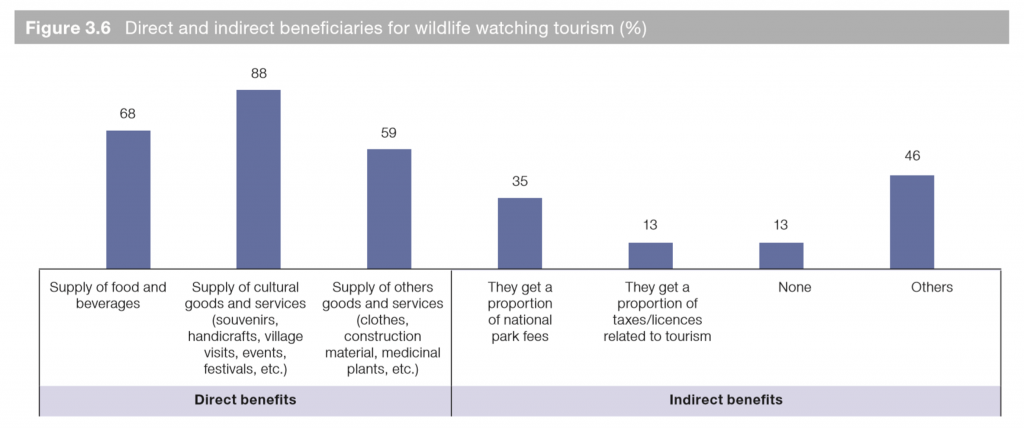While ecotourism provides clear, direct economic benefits to countries, those benefits are often underestimated, since the numerous inputs required to support the ecotourism industry are difficult to quantify. For example, items such as food, supplies, transportation, public works, infrastructure, and manpower are required to support ecotourism. Additionally, local citizens employed by the ecotourism industry often spend their wages within their community, further stimulating the local economy. In fact, the International Labor Organization estimates that one job in the core tourism industry indirectly generates 1.5 additional jobs in the rest of the economy and the workforce is mainly formed by women and young people, half of the tourism workforce is under 25 years old.
The UNWTO defines this as the multiplier effect:
The economic value of tourism can be defined as the result of all economic impacts caused by tourism. These impacts are direct, indirect and induced through the total of tourism expenditures, creation of employment, positive and negative externalities, revenues from taxes and other public charges, foreign exchange earnings and the related multiplier effects.
UNWTO concludes that wildlife watching tourism benefits a wide range of stakeholders, including national parks, local tourism providers, and local communities. As revealed by the two graphics below, the recipients of wildlife watching tourism are varied and numerous.
While this effect provides clear economic benefits to numerous individuals and sectors within a country, governments do not always capitalize and maximize these benefits. The World Bank report on tourism in Tanzania states that tourism could have a greater effect on the local economy, however:
The benefits derived from the industry are not optimal due to the following reasons: (i) foreign visitors come to Tanzania through pre-arranged packages booked abroad; (ii) over 90 percent of tourism activities are concentrated in two geographical areas; (iii) the sector has become less labor intensive over time; (iv) there are weak linkages with local communities and businesses; and (v) inefficient tax systems with complex and non-transparent mechanisms prevent the optimal redistribution of rents from tourism.
This World Bank report implies that Tanzania is losing potential profits due to inadequate tourism industry management. In previous blog posts, I discuss ways governments can directly promote ecotourism and the conservation of wildlife. This blog posts serves to reinforce the importance of ecotourism in some national economies and shed light on the full economic impact of wildlife viewing.
Countries encountering wildlife population declines and dwindling ecotourism industries are on the verge of losing more than a percentage of their GDP. The collapse of a wildlife viewing industry in sub Saharan African countries will be felt far beyond the tourism operators and immediate beneficiaries. Therefore, African countries, with the support of the US Government should continue to address the declining wildlife populations in Africa and continue to seek sustainable long term solutions to ensure these wildlife viewing industries not only maintain the status quo, but also maximize the potential direct and indirect economic benefits of the charismatic mega-fauna that populate these countries.



Hi John,
One of our teachers was wondering if we could include your Multiplier Effect diagram within teaching resources, for our hospitality course. The material would be correctly attributed and would only be accessed by our staff and students. Our staff and students would really appreciate your assistance with this request. We look forward to your reply.
Regards
Sharon Stewart
Copyright Librarian
I’m sure the image is likely from another publication. Likely fair use though.